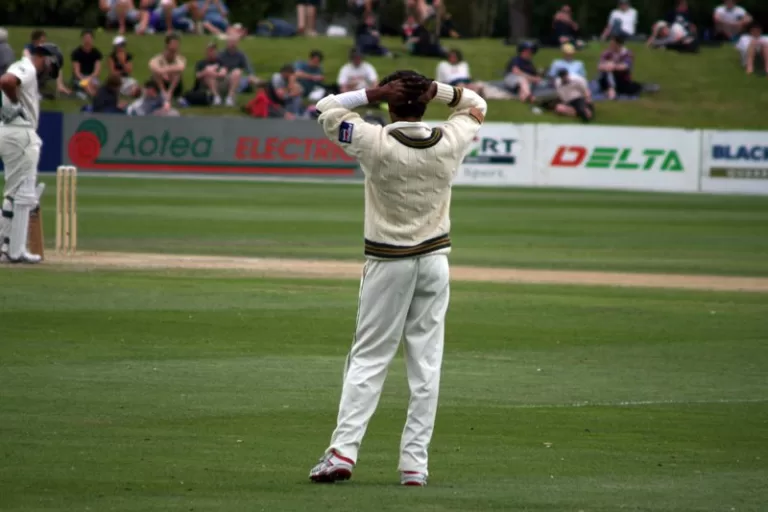Wickets in hand tend to reflect the ease with which a team should complete their chase – but for Pakistan, it’s another batting collapse waiting to happen…
In the games against India and Australia, Pakistan won the toss, decided to bowl, conceded a massive opening partnership, and somehow restricted an almost guaranteed 350+ total to under 340. The subsequent chases saw Pakistan lose an early wicket, rely on Babar Azam to consolidate the innings with an opener, lose their star batsman earlier than expected, and collapse in the deciding overs of the game. Pakistan’s inability to convert winning positions into points cost them dearly.
This is because the team failed in all three departments, and it was compounded by their floundering mental fitness. Responsible batting, regular wicket-taking, and sharp fielding should’ve taken precedence over all else for the Pakistani team – but that wasn’t the case.
.@realshoaibmalik has scores of 8 – 0 – 0 in the World Cup so far and hasn't shown glimpse of his real self as he reaches the twilight of his career
With Pakistan needing four wins in as many matches, does he warrant a place in the side? 🇵🇰#WeHaveWeWill #SarfarazAhmed #CWC19 pic.twitter.com/UYmWlDegIy
— Cricingif (@_cricingif) June 21, 2019
Irresponsible batting
It’s an age-old issue with Pakistan’s batting. No individual seems willing to stick it out in the middle overs and act as an anchor. Moreover, the batsmen have failed to adapt to the modern game – and continue to struggle when it’s time to accelerating the innings. Instead, they serve their wickets on a plate to the opposition.
Pakistan’s middle-order is not contributing at all, which cranks up the pressure on their top three. The trio of Fakhar Zaman, Imam-ul-Haq, and Babar Azam can only carry the team’s batting so far. Regardless of who ultimately follows them in the order, the likes of Shoaib Malik, Mohammad Hafeez, Haris Sohail, Sarfraz Ahmed, and Asif Ali need to pull their weight.
Pakistan went down today but their batsmen played some outstanding shots. Watch them here 👇#CWC19 #INDvPAK #WeHaveWeWill pic.twitter.com/ccesylDTXx
— ICC (@ICC) June 16, 2019
Subpar fielding
Despite Asif Ali’s inconsistency with the bat, his two dropped catches against Australia were what invoked the wrath of Pakistani faithful. Dropping David Warner was almost criminal – as the opener went on to score a match-winning hundred. In the following game, one look at India’s fielding approach against Pakistan was enough to highlight the problem.
About five times, India’s imperious fielding saved a boundary and restricted it to either a single or nothing at all. Pakistani fielders, on the other hand, witnessed the Indian batsmen run twos for fun. The men in green had to work for each and every run, and the middle-order collapsed under that pressure. A rising run-rate and terrific bowling were complemented by excellent fielding. If Pakistan are to start winning, their fielding needs to reach its Champions Trophy peak once more.
Mohammad Amir is light-years ahead 👀
Should Pakistan finally drop Hasan Ali for Mohammad Hasnain or Shaheen Afridi? #CWC19 #WeHaveWeWill #SarfarazAhmed pic.twitter.com/MbGclAnEP2
— Cricingif (@_cricingif) June 18, 2019
Wicket-taking slump
Pakistanis have always taken pride in their team’s bowling. They possessed strike bowlers with spin and pace that inevitably rescued their batsmen. However, not a single bowler is living up to his potential – or adapting to the game’s transforming needs. If a bowler bowls well from one end, the other end can be attacked. Bowling partnerships have arguably never been as crucial to success as they are now. Even Mohammad Amir, who’s among the tournament’s highest wicket-takers, is relying on loose slogs rather than brilliant deliveries.
Nonetheless, he’s the only bowler who seems to know what he’s doing. Consistent with his line and length, all he needs is strong support from the other end. He’s gotten it at the tail end of the innings, but definitely not early on. Batsmen need to score quickly and just a couple of tight overs can lead to a wicket. India’s Bumrah-Bhuvneshwar or Kuldeep-Chahal partnership is testament to this. The key to victory is picking up wickets at every stage of the innings, and the bowlers are failing to do so. If Pakistan can threaten throughout, their chances of winning the remaining games will increase exponentially.
"Loss to India made the yawning moment a bigger issue" feels Sarfaraz Ahmed while addressing the media before Pakistan's encounter against South Africa. #PAKvsSA #SarfarazAhmed #CWC19 pic.twitter.com/gCwHkvI8VQ
— Cricbuzz (@cricbuzz) June 23, 2019
There are a quite a few weak links in the team right now, but it’ll be interesting to see how Pakistan perform knowing that every match is a must-win for them. Historically, the team has done well during the group stage – and fans are unlikely to lose hope just yet. However, if the wrinkles aren’t ironed out soon, the humiliation could pile on for Pakistan.
